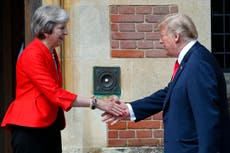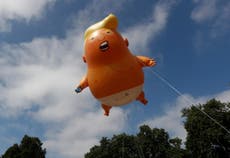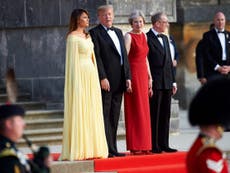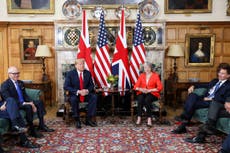President Trump is right – May’s Brexit deal does put us at the back of the queue for a US trade deal
Trump knows what he thinks about Brexit, and doesn’t mind saying it

President Trump’s remarks about the Brexit white paper, the leadership abilities of Boris Johnson and the negotiating shortcomings of Theresa May should have come as no surprise to anyone.
As Emmanuel Macron said, with a towering sense of understatement, Donald Trump is not a “classic politician”. If he were, he might be less inclined to deride and insult other countries and their leaders, and to listen more carefully to them (including Macron, who has begged in vain for Trump to stick with the Iran nuclear weapons deal and the Paris Climate Change Accord. So much for Gallic charm, then). He might not have been elected, either.
Usually an American president will steer clear of interference in others’ internal affairs, but sometimes, as we remember from Barack Obama’s famous intervention during the Brexit referendum campaign, they may oblige a little.
When Obama said, in British English rather than American English, that Britain would be “back of the queue” (not “line”) for a trade deal with the US, he too was breaching protocol, and doing as David Cameron hinted he should.
When Ronald Reagan, Jimmy Carter and Dwight Eisenhower helped out Margaret Thatcher, Jim Callaghan and Harold Macmillan with the “optics” of some well-timed visits, there was not much anyone could do about it.
When John Major’s Conservative Party – insanely – lent some of their activists to the Republicans to help out on the doomed 1992 re-election campaign of George HW Bush, and to rubbish Bill Clinton, that too was an unwise move.
Sometimes US presidents choose to humiliate British PMs or opposition leaders by refusing to meet them, or failing to recognise them when they do (Mr Reagan mistook Labour deputy leader Denis Healey for the British ambassador; Obama made Gordon Brown traipse through the kitchens at the UN for their “walk and talk”). Otherwise, and on the whole, the special relationship has been strengthened by steering away from party politics.
Up until now. In granting a lengthy bombshell interview with a Murdoch paper, and taking such a partisan side, what we have here (it hardly needs pointing out) is a triangle of collaboration between Trump, Rupert Murdoch and the Ukip/hard Brexit axis (Farage/Johnson) to manipulate British politics. Again.
It is not necessary to become a swivel-eyed conspiracy theorist to presume that conversations will have taken place between friends and intermediaries to achieve the desired result. Such is their commonality of world view and political prejudices that they hardly need to coordinate. It happens quite naturally, and, as we see now, occasionally with spectacular effects. They did it in 2016; they are at it again.
Trump knows what he thinks about Brexit, and doesn’t mind saying it. He thinks the British people voted for Brexit because of immigration. He thinks that the Brexit white paper kills off a US-UK trade deal. He thinks that Theresa May messed up the negotiations. He thinks Boris Johnson would be a great PM.
Leaving aside the diplomatic niceties, is he actually wrong about all of that?
The last one, obviously, is a silly idea, unless Trump thinks Boris is a sort of Anglicised mirror image of himself, which he probably does.
But he has a point about the Leave vote in the 2016 referendum. Irrational, xenophobic, driven by lies, stoked up by disgraceful posters (like the refugee “Breaking Point” one produced by Leave.EU), a massive misunderstanding of the rules about “free movement” of labour, scare tactics about Turkey being about to join the EU… all that happened.
The fact that immigration was an issue and persuaded some people to vote the way they did is hardly an outrageous proposition in political science. And the Brexit white paper is undeniably vague about the future of EU migration to the UK.
As for the US-UK trade deal, I think we can see what’s happening there, thanks to our old friend the chlorinated chicken. This unlikely symbol of American economic prowess is banned in the UK – by the EU. If adopting the EU rule book as the “common” UK-EU rule book means that the all-American chlorinated chicken cannot land on our shores, then indeed the US-UK trade deal is as dead as the poor old bird that symbolises it.
No doubt the prime minister will attempt to explain (in what Trump regards as a condescending way), that the UK can import chlorinated chickens if wants, because her reading of the white paper says so. “Womansplaining”, you might call it.
Then Trump has a choice. If he agrees with her, then that might be fine, if the EU were happy to change its rules on chlorinated chickens and allow the British a chlorinated chicken opt-out. If the EU doesn’t and the new rulebook means the chicken is still banned – then no US-UK trade deal.
If Trump is unconvinced by Theresa May’s patient explanations then, again, there will be no US-UK trade deal. That’s because Trump is the president. Simple as that.
As for May’s negotiating skills… well, we’ve had two years now and we haven’t got very far. Had, as Boris Johnson suggested, Trump gone toe-to-toe with Michel Barnier, things might have been better. It’s a tantalising fantasy. The tweets would have been funny.
The great, glorious irony of the Trump visit to a Brexit Britain is that, just as Obama once said, Britain does indeed find itself at the back of the queue for a trade deal. It is the only Obama policy that Trump is happy to implement. It’s that bad.








Join our commenting forum
Join thought-provoking conversations, follow other Independent readers and see their replies